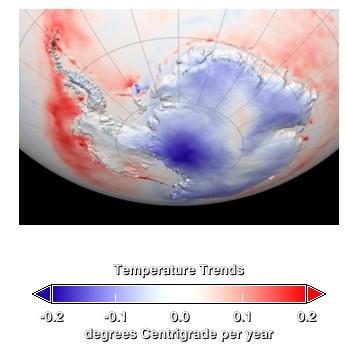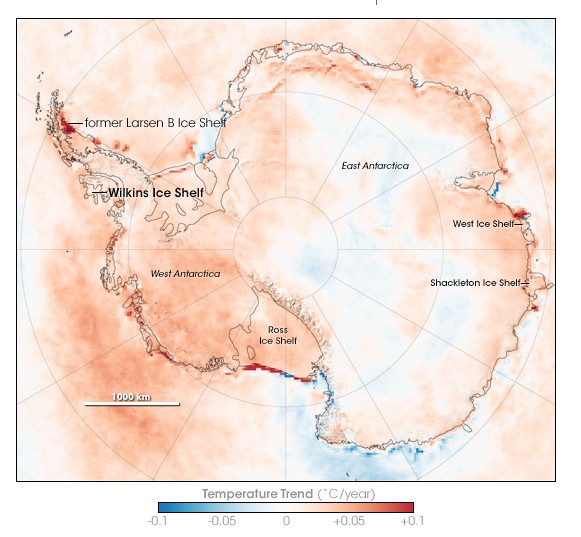In 2005, NASA showed that Antarctica had been strongly cooling for 20 years
Gavin Schmidt (current GISS head) reported that Antarctica temperatures “decreased significantly”
Shindell and Schmidt 2004
Shindell, D.T., and G.A. Schmidt 2004. Southern Hemisphere climate response to ozone changes and greenhouse gas increases. Geophys. Res. Lett. 31, L18209, doi:10.1029/2004GL020724.While most of the Earth warmed rapidly during recent decades, surface temperatures decreased significantly over most of Antarctica.
But that story wan’t going to scare anyone into giving up their money, so in 2007 they simply changed Antarctica’s history from cooling to warming.
Disintegration: Antarctic Warming Claims Another Ice Shelf : Feature Articles




Number of molecules in the atmosphere 1*10^44
Number of CO2 @400 ppm = 4*10^40 molecules
Anthropogenic CO2 @ 4% = 1.6 *10^39 molecules
Per person @ 7 billion = 2 * 10^29 molecules produced per person
CO2 per breath = .036 grams
CO2 exhaled in a lifetime = 2*10^6 grams = 2.8*10^28 molecules
1 gram of CO2 = 1.4 * 10^22
What you are producing in a lifetime (sans breathing) = c. 10 molecules
Per bottle of beer @ 1.8 grams CO2 = 2.5*10^22 molecules
Keep a beer in the fridge and save the planet
And no data to contradict them – I think they finally found a way to hide the adjustments.
Temps have been running -2 to 5C below normal their entire winter so far in 2014. All time record low was recorded a few weeks ago at where the 13 scientists lost power at the one station camp.
Oh njsnowfan… don’t you know 2014 is one of the hottest on record??
Quit the lies and go read some truth over at the Hufington Post… 🙂
Antarctica is losing ice-mass and contributing the sea-level rise, though.
Since we have no way of directly measuring the ice-mass of Antarctica, we have to extrapolate estimates of ice mass from other measurements. There are tremendous uncertainties involved, and it might be prudent to not be quite so categorical about it. Still, even if we assume that what you say is correct, should we be concerned? Is current ice loss unusual? What would we expect ice mass to do during an interglacial period? If we really are losing mass, how much (and with what error range)? What amount of sea level increase is that? Is there anything that indicates we are experiencing anything catastrophic?
There are satellites in place measuring Ice Mass …
It is interesting to compare and contrast the difference between the US’s McMurdo Base (by far the largest on the continent) and all others(all much smaller and very compact) say Britain’s Halley bases.
US McMurdo –
http://en.academic.ru/dic.nsf/enwiki/135913
UK Halley –
http://www.antarctica.ac.uk/living_and_working/research_stations/halley/halleyvi/?page_id=8
Now I wonder if there is a heat island effect at McMurdo?
They move the thermometer inside…
Proves Global Warming better…
Now there’s a thought.
Seriously I’m sure they would have given it a look. I’m just fishing for information, if anyone has any.
Antarctica continues to defy the global warming script, with a report from Meteo France, that June this year was the coldest Antarctic June ever recorded, at the French Antarctic Dumont d’Urville Station.
According to the press release, during June this year, the average temperature was -22.4ºC (-8.3F), 6.6ºC (11.9F) lower than normal. This is the coldest June ever recorded at the station, and almost the coldest monthly average ever – only September 1953 was colder, with a recorded average temperature of -23.5c (-10.3F).
http://wattsupwiththat.com/2014/07/12/coldest-antarctic-june-ever-recorded/
And remember that June is the last month of spring…
Losing ice mass at -22ºC?
Correction, is the last month of autumn. After that, comes the loooong winter